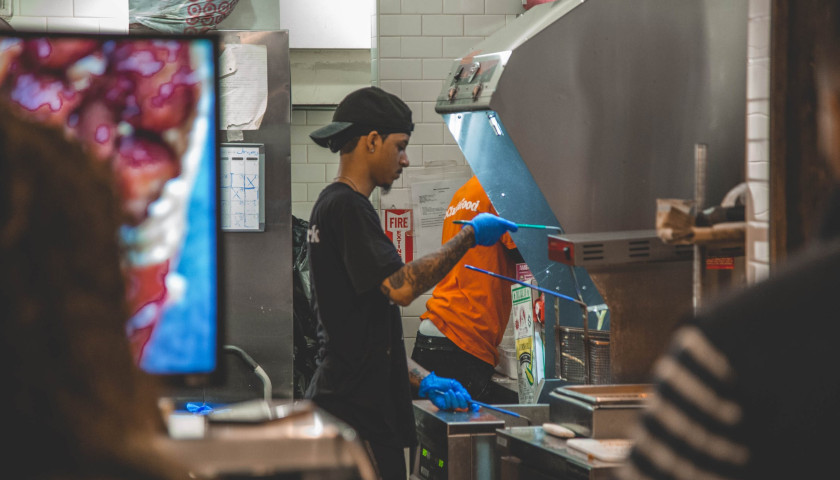by Bill Wirtz
Minimum wage laws are intended to help those who are making very little money, yet they achieve quite the opposite. Can you really say you stand for the disadvantaged if you support minimum wage laws?
Moral Superiority
Minimum wage laws have been around for a while, so contesting their existence becomes progressively more difficult. For most people, even those who purport to stand on the more “free-market” side of issues, the guarantee of minimum payment to all workers is a no-brainer.
For labor unions and politicians, increasing the minimum wage is an easy sell: Once instituted, the hourly minimum rate can be gradually elevated at no expense to the government, eliminating the necessity to answer pesky questions about “who is going to pay for that?”
There is also the added bonus of establishing easy rebuttals to any opposition: anyone arguing against minimum wages (or increases thereto), must have vested financial interests in that area or simply lack empathy for low-wage workers.
However, the reality is that the very people who need a boost in the labor market are denied it as a direct result of these laws. The minimum wage asks employers to pay workers above the value of their hourly work, either forcing them to be charitable (unlikely) or leading to the rational conclusion of opting to automate a job or forgo hiring an extra person in the first place.
There are several categories of people affected by this more so than the average worker. Here are three of them:
1. Teenagers
A 2006 University of Georgia study found that every 10 percent increase in the minimum wage was associated with a 4.6 to 9 percent decline in teenage employment. The researchers added: “Moreover, a 10 percent increase in the minimum wage reduces average retail hours worked by 5 percent, and, among teens who remain employed in the retail sector, reduces average hours worked by 2 to 3 percent.”
We know that most scientific studies have confirmed similar results with some variation. Most of the studies have found negative effects of the minimum wage on youth employment dating back as far as the Department of Labor statistics from 1915.
A 2018 Mercatus Center paper found that the minimum wage played a predominant role in the shift toward increasing youth unemployment in the United States since the year 2000.
2. African-Americans
The argument on the stated racist origins of the minimum wage in the United States has already been well-documented and explained by Professor Deirdre McCloskey. The minimum wage was designed to keep non-Anglo-Saxon workers out of the labor force by raising the cost of hiring minorities.
Thomas Sowell made a case for analogous policies in other countries:
In 1925, a minimum-wage law was passed in the Canadian province of British Columbia, with the intent and effect of pricing Japanese immigrants out of jobs in the lumbering industry.
Sowell explains that similar instances can be found in Australia and South Africa, where racists and white union activists pushed for minimum wage legislation in order to avoid minority competition as a result of accepting lower wages than white workers.
Prior to the Fair Labors Standards Act (FLSA), which instituted the first federal minimum wage of 25 cents per hour, the black-white unemployment gap did not exceed 1 percent. Today, the black unemployment rate is twice that of whites. Raising it, as is suggested by multiple Democratic presidential candidates, would only accelerate this phenomenon.
3. Ex-Cons
A criminal conviction for a non-violent offense (such as drug offenses) punishes a person unjustly, not only in time lost during his or her imprisonment but also through the consequences that a period of incarceration will have on their future employment prospects.
The latter consequence also applies to serious criminals who find it harder to get a job when released. While you might think it proper that a murderer would find it difficult to get a job, if you believe that a human being can better him or herself by reintegrating into everyday life, then it should not be made harder for that goal to be achieved.
- A 1976 review published in the Monthly Labor Review projected that both federal and state minimum wages would affect individuals who were “in particularly poor bargaining positions (in prison and immediately after release).”
- A 2013 Boston College study claimed that raising the minimum wage actually increases crime (theft, drug sale, and violent crime) in the United States due to a decrease in labor income resulting from a reduction in work.
- With companies announcing that they are increasingly hiring ex-cons for minimum wage jobs, their employees will also be affected by increases in the minimum wage in the form of reduced working hours.
Beware of Unintended Consequences
Further questions can be asked regarding the effects on other groups, such as the mentally ill, who also often find themselves in low-paying jobs or co-subsidized employment situations and have difficulty competing with other workers.
This is the inherent problem of the minimum wage: it prevents those who are disadvantaged, in one way or another, from competing by offering their labor for less.
Policymakers need to be aware of the unintended consequences of minimum wage laws and evaluate the real-life effects of the measures they impose on the economy.
– – –
Bill Wirtz is a Young Voices Advocate. His work has been featured in several outlets, including Newsweek, Rare, RealClear, CityAM, Le Monde and Le Figaro. He also works as a Policy Analyst for the Consumer Choice Center.




